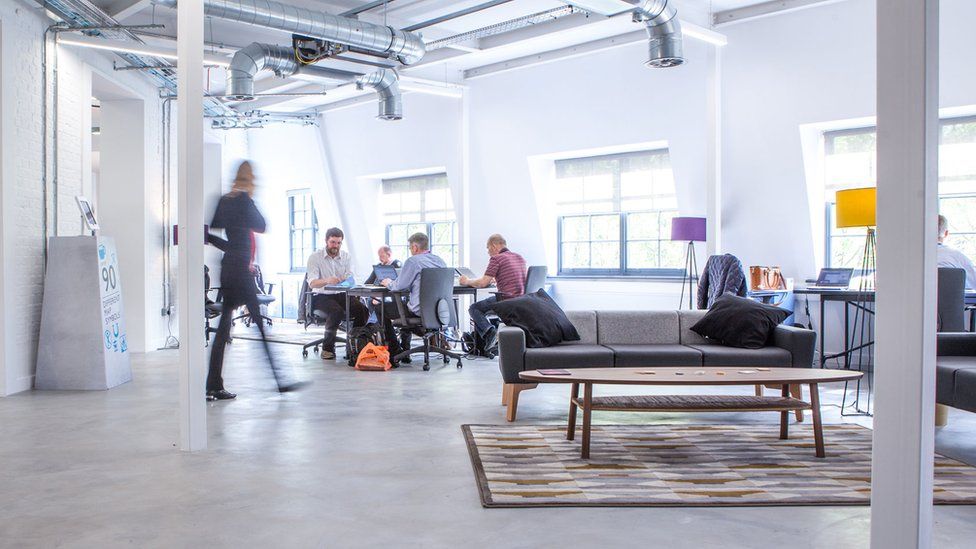How maps are powering the tech revolution
- Published

Remember Hugh Grant's bachelor pad in About a Boy? This epitome of a cool central London home has now given itself over to the British map maker Ordnance Survey.
It's the site of their start-up hub, helping young companies which are using their mapping technology. It's a world away from Ordnance Survey's (OS) concertina'd, paper-based business, but location, location, location still matters here.
Where we are and where we want to go is at the heart of so many of the world's most innovative businesses.
Think of Uber, Deliveroo, Airbnb, the development of driverless cars, and drone deliveries. All of these companies need location data to power their software.
In fact there are very few sectors which don't rely on it. Some estimates say the global market for core geographical information will exceed $13bn (£9.6bn) by 2025, according to consultancy firm Navigant.
Carmakers are among the companies hungry for mapping data, according to Martin Garner of tech consultants CCS Insight. "Developments in mapping are mainly being led by the transportation industry in its push towards intelligent and self-driving cars and trucks," he says.
In December 2015, for example, BMW, Daimler, and Volkswagen's Audi acquired the digital mapping company HERE from Nokia for $3.1bn to provide their own in-house source of data.
Mr Garner says the value of location data lies in its ability to mirror every aspect of the world around us. He says technology is turning maps into living databases of places, objects and people where live information comes from a wide range of sources, and is used by lots of different people.
OS, founded back in 1791, makes most of its £150m yearly revenue from the private companies who use its data - such as Garmin's sat navs - and through big public sector agreements providing data for bus routes, planning and flood prevention.
But a third of its products can be used for free. It's that information - on our roads and rivers - which provides the backbone for so many other companies, including Google Maps.
OS decided to open the Geovation hub in London in 2015. The company felt it was behind the curve on how its mapping data was being used and that it wasn't seeing the benefits of giving the information away for free.
The hub's 900 members range from industry stalwarts to A-level students, but are mainly start-up companies who rely on location data to develop their products.
Taking a leaf out of the financial industry's book, they've even developed a new word for the companies they work with: Geotech.
For Alex Wrottesley, who runs the hub, there are many advantages of this kind of interaction with start-ups, and he says it's often the best way of bringing things to market.
One of the companies based in the hub is Openplay, which aims to create a comprehensive list of leisure activities and venues across the UK, including in church halls and community centres.
Its boss, Sam Parton, uses a combination of OS maps and shoe leather to build the database. "Parks and open spaces don't have postcodes so it can be very difficult to find events happening in them. We've gone out and practically listed them ourselves," he says.
Richa Bhalla who runs Pedals, a green courier company based in the Geovation Hub, says mapping is about more than getting goods from A to B. It tries to use commuters to deliver packages in the safest and least polluted way they can.
Pedals overlays OS data with other sources to do this. "It is all about logistics, getting to places as fast as possible, using green cycle lanes rather than busy roads," Richa says.
Apart from those companies that have won free placements on one of their accelerator schemes, the programme is funded by a small fee from the businesses who work there and sponsorship deals with private companies.
However, the OS is also looking to the start-ups as future money spinners - as it starts to take stakes in the most successful. The aim, it says, is "to create new revenues for our long-term future".
Implicit in this drive for innovation and those words "long-term future", is the axe that has hung over the future of the OS in recent years.
OS was made a government-owned company in 2015 - a technical term meaning it has greater commercial freedoms such as how to pay its staff - but it remains in the control of the state alongside the likes of Companies House, Network Rail and the Royal Mint.
There was speculation when this happened that the government could look to sell it. However, in a recent statement, the Department for Business said categorically "there are no plans to privatise Ordnance Survey".
OS sees its long-term future in embracing new technologies like providing data for smart cities, the roll out of 5G and driverless cars.
And it's not the only one. James Hodgson, a senior analyst in smart mobility and automotive at ABI Research, says the mapping industry is being transformed.
"Profitable map building isn't a matter of owning the capital for map creation," he says. Instead, it's about having the ability to ingest data from lots of devices to "build a continuously up-to-date, accurate representation of the world".
"As traditional map building becomes less viable and less profitable, the traditional map builders are having to innovate."
Mr Wrottesley is confident OS knows what its core customer wants: "We've been selling our services for 200 years."
For OS - like others in the mapping industry - it's about how to map the next few decades as well.